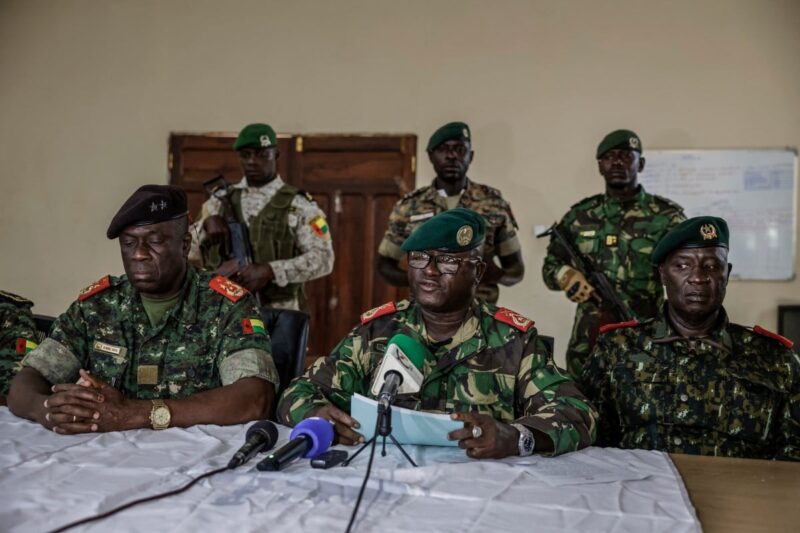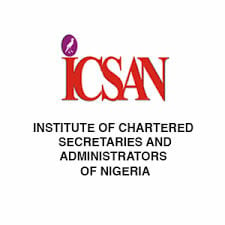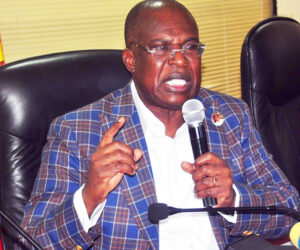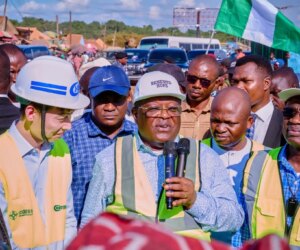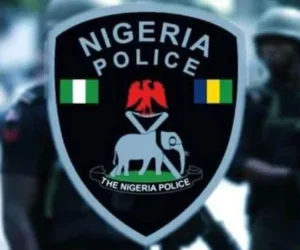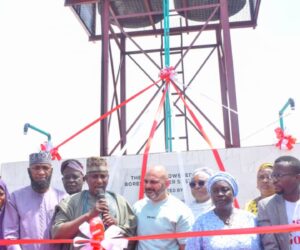Hours after gunshots were heard near the Guinea-Bissau electoral commission headquarters on Wednesday, a group of military officials announced a takeover of the government until “further notice.”
The gunfire lasted for about an hour. However, no casualties were recorded.
The army, in its speech, announced the removal of incumbent President Umaro Embalo from power, the halt of the electoral process, the closure of the country’s borders, and the imposition of a curfew.

This has drawn criticism across West Africa, with several governments and regional blocs calling for a return to constitutional order.
The Nigerian government described the coup as a breach of the ECOWAS Protocol on Democracy and Good Governance. It also noted that the coup undermined the regional commitments member states have made to constitutional rule and political stability.
The election observer missions of the African Union and ECOWAS also called the coup an attempt to erode the country’s progress toward stability. Ghana said it viewed the “development with profound concern” and expressed “deep dissatisfaction at the brazen attempt to overturn the will of the people of Guinea-Bissau.”
As calls for a return to democratic rule intensify, here are five key facts you should know about Guinea-Bissau.
1. A history of coups
The 26 November coup is not the first coup the country has experienced, nor is it the first military takeover in recent times.
Guinea-Bissau has faced chronic political instability since its independence from Portugal in 1974. Power struggles between the military and civilian leaders, weak state institutions, and factional politics have repeatedly triggered military interventions.
The country’s first coup was in 1980, when President Luis Cabral was ousted in a bloodless coup led by Prime Minister Joao Vieira.
Five years later, several senior military officers, along with the first vice president, were arrested for an alleged coup attempt against the Prime Minister.
Six of those detained were executed in 1986, while many others died in detention.
Between 1998 and 1999, a civil-military conflict erupted after Mr Vieira dismissed his army chief. The fighting ended when he was ousted in 1999 by Ansumane Mane, another military ruler.
The country also experienced another coup in 2003, overthrowing an interim elected president, Kumba Ial. The country also experienced coups in 2009, 2012, and 2022.
In 2023, President Umaro Embalo dissolved the country’s parliament, alleging that elements within the security forces were plotting to remove him. Then, in October 2025, the army arrested some of its officials over a foiled coup plot.
2. Coup stops announcement of election results
Wednesday’s coup, carried out by a group of officers who describe themselves as the “High Military Command for the Restoration of Order,” occurred before the scheduled release of election results.
The country held its presidential election on Sunday, and the results were to be announced on Thursday.
The poll, according to observers, was largely peaceful and had a large voter turnout.
PREMIUM TIMES reported that the election had pitted incumbent President Embalo, the candidate of Madem‑G15, against leading opposition candidate Fernando Dias, the candidate of the Party for Social Renewal (PRS).
Both candidates had earlier announced themselves as the winner of the election.
Just two days before the coup, the opposition candidate, Mr Dias, had said, “We have won the presidential race. We will not have a runoff. My people are very tired, and they need a change at the top of the state.”
However, Oscar Barbosa, a spokesperson for Embalo’s campaign, told a separate press conference that Mr Embalo had won outright, ruling out the need for a runoff.
3. Incumbent president sought second term
Mr Embalo sought to become the first president in 30 years to secure a second consecutive term.
He announced his decision to run for a second term in March amid serious political tensions.
The opposition also vehemently refused to recognise him as the country’s current president, arguing that his first term had already ended.
Officially, Mr Embalo’s term ended in February.
“I will be a candidate for my own succession,” Mr Embalo had said to reporters at the time.
Guinea-Bissau’s constitution sets the presidential term at five years, renewable once, which allowed Mr Embalo to pursue a second term.
He argued that his first term’s initiatives, particularly in security, economic reforms, and political stabilisation, needed more time to be fully implemented.
4. Oldest political party barred from election
Meanwhile, in September, the main opposition party, the African Party for the Independence of Guinea and Cape Verde (PAIGC), was disqualified from participating in the elections.
The official reason given for this was that it allegedly failed to submit its list of candidates 72 hours before the registration deadline, which was considered late. However, observers and opposition parties argued that the allegation was politically motivated, adding that judicial and electoral rules were being used to exclude the main opposition and thereby tilt the playing field in Mr Embaló’s favour.
The ban on PAIGC made the election far less competitive. The party that fought for the country’s independence from Portugal was the oldest and historically most influential party in the country.
This is the first time since independence that this party has been excluded from a presidential race.
The party, led by the former Prime Minister, Domingos Pereira, threw its weight behind the leading opposition candidate.
5. Guinea-Bissau’s Portuguese history
Guinea-Bissau was colonised by Portugal. The country was under colonial control for decades and gained independence in 1964. In West Africa, only three countries have Portuguese colonial history: Guinea-Bissau, Cape Verde, and São Tomé and Príncipe.
Portugal began by establishing trading posts along the coast of present-day Guinea-Bissau as early as the late fifteenth century, making it one of the earliest points of European contact in West Africa.
For much of this period, however, Portugal’s influence remained limited to coastal enclaves involved in trade. Colonial control began effectively in the late nineteenth century, when Portugal started military campaigns to assert authority over the interior, a process often referred to as “pacification”.
These campaigns continued into the early twentieth century and were largely completed by around 1915.
READ ALSO: Reps end three-day special session on security with tough warnings, far-reaching demands
The independence of the West African nation occurred through years of armed struggle between Portugal and the PAIGC, which at the time was backed by Cuba, the USSR, and Yugoslavia.
The country declared independence in 1973, while Portugal formally recognised it in 1974 after the Carnation Revolution ended the dictatorship in Lisbon.
Cape Verde and São Tomé and Príncipe were also colonised until the 1970s, when independence movements gained momentum, and Portugal’s 1974 revolution brought an end to the rule.

